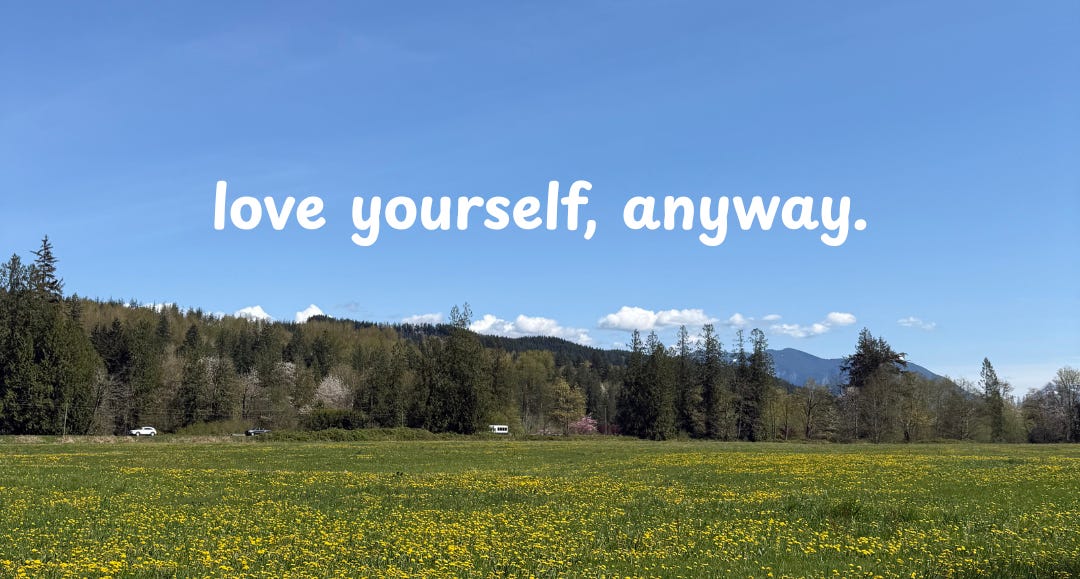Chances are that if you’re a human, you oscillate between labeling yourself as “too much” or “too little.” You analyze yourself in the mirror until the pimples on your face look like mountains, or until the bags under your eyes look like bruises, or until the face that stares back at you is foreign.
You look at yourself until you become something other than human.
A trophy that must stay shiny, placed atop the tallest shelf or risk fading into obscurity.
A pendulum, swinging back and forth in a rhythmic motion, never sitting still. Never feeling still.
A memory, infected with a nostalgia that makes the demons of the past look pleasant, and the current version of yourself a monster.
Anxiety propels us into the deadly cycle of comparison—the cycle of being this or being that, but never simply being. It leads me to wonder… Why can’t we sit still in ourselves? Why can’t we just be?
The Wart
When I was seven, I had a wart on my thumb, and I thought that made me bad. I thought that any physical imperfection inherently changed my value because it existed. Because it could be seen and judged and noticed.
Though flawed, it makes sense that I thought this. Just look at the TV shows we watched growing up: the villain is ugly, has warts, has a big nose, and is bad. I had a wart. I had a big nose. I thought I was ugly. Did that make me bad?
Meanwhile, the main character is radiant, unselfish, unblemished, and unscared.
What little girl ever sees herself as that?
My Elementary School Insecurities
One day in first grade, my class was instructed to form a large oval and hold hands.
Hold hands. The only thing I could think was: wart, wart, wart.
My seven-year-old self was mortified. She wanted to run away—not to save herself from humiliation, but to save the boy from having to touch her: a disgusting, non-human creature.
I bring this example up, not to shame anyone, but to express how having physical “flaws” makes us feel inhuman. We feel like the evil villain in a Disney movie, or the ugly best friend in a coming-of-age rom-com.
The humanness of flaws.
The problem is, flaws are what make us so incredibly human.
As writers, we are told to “humanize” our characters, and you know what that means? IT MEANS GIVING OUR CHARACTERS FLAWS. And then you know what happens? PEOPLE LIKE THEM BETTER.
Flaws are inherently human. They’re vulnerable. They’re always going to be there. And that’s okay. It’s okay to have aspects of ourselves that aren’t perfect. It’s the quirks that make you YOU. It’s the weirdness that makes you something other than robotic. You have personality, you have skills, you have weaknesses, you have humanness.
Humans will always have: Moles, warts, asymmetry, fat, bony bits, awkward voices, curves, lines, scars, blemishes, wrinkles.
This is what we’re going to do:
We have these flaws, and we’re going to love ourselves, anyway.
Love. Ourselves. Anyway.
I’m not going to sit here and tell you to suddenly embrace the beauty of the wart, to tell you that you have to start thinking it is the prettiest thing about you, but I am going to tell you that having a wart is human.
Having imperfections is human. Having imperfections does not make you bad, does not make you worthless, does not make you evil, does not make you ugly, does not make you undesirable, does not make you an alien, a monster, a weirdo… because you know what’s crazy? We all have them.
I bet you that everyone reading this blog has something they are self-conscious about. Not only one thing, but three, four, five, ten, twenty, fifty. I bet you that everyone could sit here and write pages upon pages about things they don't like about themselves. Yes, even the people that you wish you looked like, or acted like, or talked like. Everyone has flaws, even if they manifest differently.
The bottom line
You don’t need to be unattainable to be worthy of love, life, and happiness. I hope you find it within yourself to love yourself, anyway.
Love. Yourself. Anyway.
Love always,
Laura








Love 🥹 this and you xoxo
I love this!